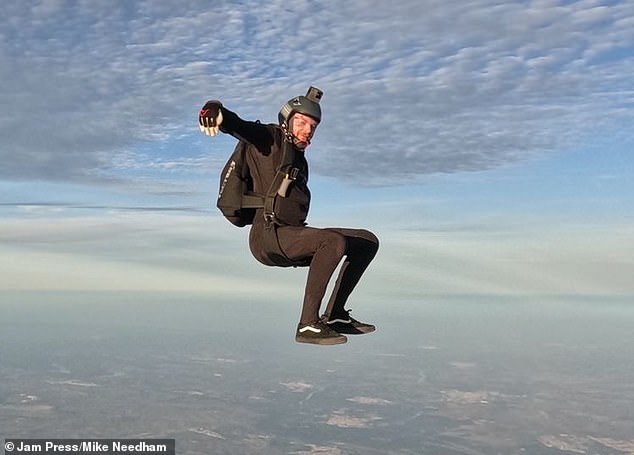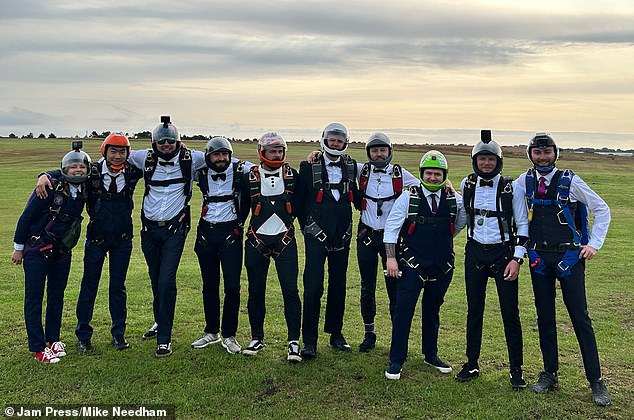Skydiver, 31, lucky to be alive after parachute fault left him plunging to the ground at 70mph
A Middlesbrough man is lucky to be alive after a catastrophic parachute malfunction during a skydive left him plunging back to earth at 70mph.
The 31 year-old suffered eight broken risks and a fractured spine, leaving him permanently paralysed and reliant on a wheelchair to get around.
Kirk Trainor, of Middlesbrough has done nearly 700 successful jumps, but on the fateful day in May, the mechanism that slows the parachute's decent failed to work.
Although the parachute slowed his fall slightly, the plummet was still fast enough to kill him.
Now, Mr Trainor's friends have launched fundraising initatives to help raise funds for experimental private treatments that could help him walk again.

Kirk Trainor, of Middlesbrough, who has done nearly 700 jumps, suffered eight broken ribs and a fractured spine

The 31-year-old is still in hospital two months after losing control of his parachute in the terrifying fall on May 11
Multiple appeals have been set up online, including a GoFundMe page that has raised nearly £14,000 in just five days.
Another had over £1,340 in donations of its £6,000 target.
Recounting the terrifying ordeal, Mr Trainor said: 'My hand slipped off the toggle which brakes the parachute as I was coming in to land and I didn't have time before hitting the ground.
'I landed feet first and all the force of the impact went into my lower spine just above the lumbar. My legs just stopped working and I knew it was serious.
'It's like being in a motorbike accident but I'm lucky to be alive. It could have been worse — people have died in similar accidents.'
He added: 'My most critical injury has been the spinal cord damage that has resulted in lower limb paralysis with no movement from my belly button down.'

He did not have enough time to time to recover the toggle before hitting ground at an estimated 70 mph

To help him fund his wheelchair and hopefully pioneering stem cell treatment, friends Mike Needham and Scott Middleton, have started fundraisers

Mr Trainor found himself in trouble on the jump when he lost control of a toggle which connected to a line used to make the parachute to break or slow down

To help with the financial costs, his friends Mr Needham and Mr Middleton, have set up appeals online, one of which has raised more than £19,600. Another had over £1,340 in donations of its £6,000 target
After undergoing surgery to stabilise his spine, he remains in hospital recovering — where he has now been for two months.
While NHS doctors have few treatments to offer Mr Trainor, private clinics offer experimental therapies like stem cell transplants.
Stem cells, which are 'shape-shifting' cells, are able to develop into many different cell types, and can be used to help re-grow nerve fibres in the damaged spinal cord, according to UK Stem Cell Foundation.
Taken from the patient’s own body, the cells are purified and then reimplanted in an area where cells have died.
Mr Trainor's GoFundMe page reads: 'Over the next few months as Kirk continues his treatment, I [friend] aim to help him maintain some independence by raising funds for a lightweight wheelchair, which costs around £6,000.
'This will aid in his daily mobility and enable him to return to work.
'Should we raise more than needed for the wheelchair, the additional funds will go towards Kirk's stem cell treatment trial which is approximately £100,000.
'Every contribution no matter the size, will significantly impact and alleviate the hardships Kirk faces during this challenging period.
'As Kirk's friend, I am appealing to my family, friends, colleagues, and the broader community to gather the necessary funds for his recovery, which will undoubtedly take time.'















































































































































































































































































































































































